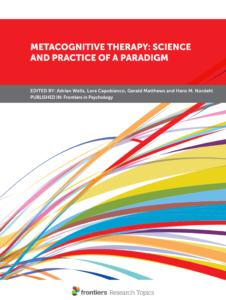Visit the MCT Institute Website HERE
Our Treatment Approaches
What is MCT
Latest Research
Metacognitive therapy (MCT) is a recent treatment that is proving to be highly effective for a range of anxiety disorders and depression. A special issue in the Journal Frontiers in Psychology presents recent research in MCT by members of ADePT and our international collaborators. The special issue brings together 100 academics and clinicians from across the world contributing to 31 articles and has been viewed over 300, 000 times.




